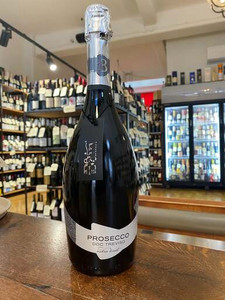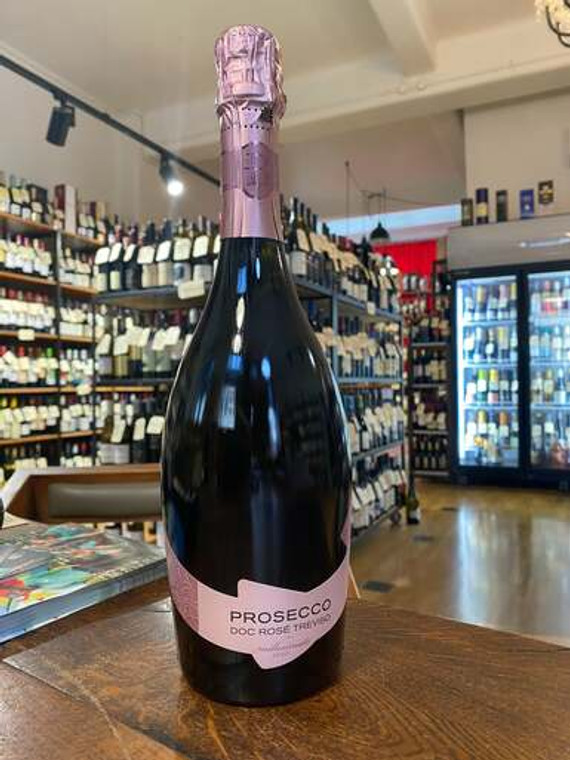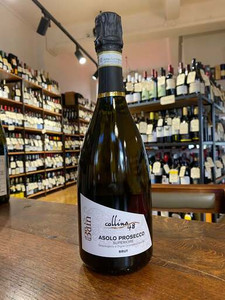
TASTING NOTE
The delicate pink hue anticipates a subtle succession of floral scents of rose and eglantine, intensified by notes of white-fleshed fruits and delicious hints of fresh red berry fruits. The lively and vibrant nose perfectly matches the crisply lingering freshness on the palate. Elegant lingering fine perlage.
GRAPE VARIETIES
Glera 85%, Pinot Noir 15%
TERROIR AND CLIMATE
The grapes for our Prosecco DOC rosé Treviso are harvested from family-owned Glera and Pinot Noir vineyards located at the foot of the “Colli Asolani” hills, that stretch from east to west at the northern end of the province of Treviso (Veneto). These vineyards enjoy good sun exposure and benefit from the mild, temperate climate of the area. The typical soil composition of the Asolo area results in a fuller Prosecco with finer bubbles that give the wine a distinctive creamy texture.
WINEMAKING
The destemmed Glera grapes are soft pressed and immediately separated from skins. Primary fermentation occurs at low temperature to preserve the fresh fruit flavours that are typical from the Glera variety. On the other hand, crushed Pinot noir grapes undergo maceration in the style of a red wine. The juice is left in contact with the skins for 3-4 days to allow colour and aroma extraction from the skins. The winemaker then strains the juice from the skins into clean tanks where Pinot Noir completes its fermentation. The two base wines are blended for secondary fermentation by the Charmat Method. Glera and Pinot noir are mixed with a measure of sugar and yeasts who cause a second fermentation in the closed tank, which is held under pressure so the carbon dioxide from the fermentation is forced into the wine. Temperatures are constantly monitored throughout the process, that lasts a minimum of 60 days. Once the desired pressure has been reached, the wine is cooled to block further fermentation and encourage settling of the lees. The wine is then fined and filtered, tested for DOC compliance and finally bottled under pressure, to preserve the bubbles, using our state-of-the-art bottling line.
Bedin -
Società Agricola Colli Asolani
The history of the “Società Agricola Colli Asolani” dates back to the early 1900, when the great grandfather Giovanni Bedin started working as a nurseryman and growing his own vines. At that time in northern Italy the rural landscape was dominated by vines growing together with mulberries, whose leaves constituted the sole food source for silkworms.
Giacomo Bedin, the grandfather, inherited his father’s passion for the land and followed his footsteps purchasing the estate in Cornuda in 1948. Here, in the smooth fertile hills that overlook the sanctuary of “Madonna della Rocca”, he planted the first vineyards and passed down to his son Giovanni the constancy and resourcefulness of the past generations.
Giovanni Bedin combined the ever increasing viticultural activity with stock-breeding. Under his direction, in the late ‘60s, the company promoted the first edition of the “Mostra del vino” in Cornuda: a traditional wine exhibition that contributed to the strengthening of the relationship between the territory, its inhabitants and its quality wines, destined to become internationally-awarded excellences. Giovanni carried on the stock-breeding activity until the second half of the ‘80s and planted three hectares of vineyards altogether, introducing his sons to the art of winemaking.
Enrico Bedin, the current owner, and his brothers Luigi, Denis and Damiano joined the company and marked a turning point by gradually transforming it from a traditional farm to a modern winery, in line with prevailing market demands. The Bedin brothers, remaining faithful to the core values they inherited from their ancestors, enriched the estate with the acquisition of new vineyards and the construction of new winemaking, bottling and packaging facilities.
Today the “Società Agricola Colli Asolani”, with its 40 hectares of vineyards, is a modern winery, projected into the future but well-rooted in the past of his homeland. After four generations, the Bedin family still manages to transform its passion into a career, combining the careful attention to product quality with the efforts to enhance and promote the territory through the preservation of autoctone vines, rich in aromas and flavours of the local countryside.








